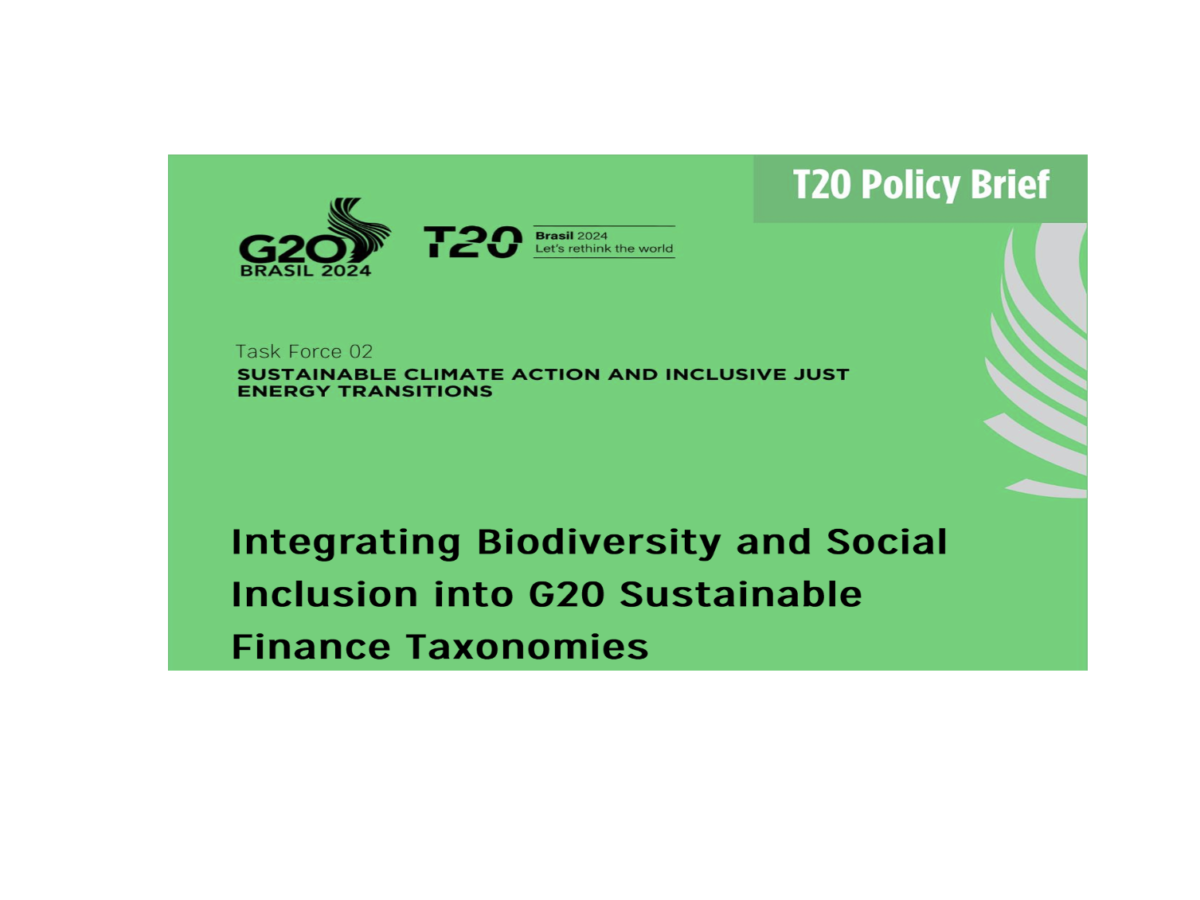
Integrating Biodiversity and Social Inclusion into the G20 Sustainable Finance Taxonomies | ThinkTwenty (T20) Brasil 2024 – Official Engagement Group of G20
September 19, 2024
In recent years, sustainable finance taxonomies have become a priority on many national and global policy agendas due to their great potential to direct finance flows to climate-friendly, environmentally sustainable, and inclusive economic activities. Taxonomies play an integral role in creating a common classification language that helps identify sustainable investments, foster greater standardisation, and enhance market transparency. Most of the 40 developing and adopted taxonomies around the world focus on climate change objectives, but only 12 of them consider nature loss. As over half of the world’s GDP – $44 trillion – is moderately or highly dependent on nature and its services associated with the loss of biodiversity, nature-related risks associated with the loss of biodiversity are identified as having significant macroeconomic implications; and failing to account for, mitigate, and adapt to these risks can affect financial stability. Similarly, social inequalities and existing vulnerabilities of marginalised groups are further exacerbated by climate change. However, only a few taxonomies have integrated social objectives so far, despite the multiple benefits of socially valuable investments that can improve livelihoods and community resilience.
The G20 encompasses a unique mix of developed and emerging economies as well as biodiversity-rich producer and consumer countries. Therefore, the G20 countries should be at the forefront in developing comprehensive financing strategies aligned with nature- and socially positive outcomes. This T20 Policy Brief analyses the current integration of biodiversity and social inclusion of land- and ocean-based activities in taxonomies and seeks to propose opportunities and recommendations on how to incorporate these aspects into the taxonomies of G20 countries and beyond.
This T20 Brasil Policy Brief “Integrating Biodiversity and Social Inclusion into G20 Sustainable Finance Taxonomies” provides recommendations to G20 officials involved in the Sherpa and Finance tracks, in the following manner:
- Biodiversity-related recommendations
- The G20 Sustainable Finance Working Group (SFWG) should promote the inclusion of biodiversity-specific objectives and related economic activities into existing & developing taxonomies.
- The G20 countries should lead by example.
- Recommendations on social issues:
- G20 SFWG should take the lead in promoting the development of social taxonomies.
- G20 Financial Inclusion Working Group should boost the Global Partnership for Financial Inclusion under the Brazilian presidency.
- Cross-cutting recommendations: Promote the inclusion of the blue economy as a perfect catalyst for multiple socio-environmental objectives.
This Policy Brief was drafted by the authors on the right, as well as Dr Thauan Santos, PhD.
As part of the G20 Sustainable Finance for Nature & People project, led by the Post2020 Biodiversity Framework – EU support project, funded by the European Union and implemented by Expertise France, this T20 Policy Brief was elaborated in collaboration with the Brazilian Naval War College, the Grupo Economia do Mar – GEM and the gFIS – grupo Finanças e Investimentos Sustentáveis.
What is the Think20 (T20)?
Think20 (T20) is an official Engagement Group of the G20. It serves as an “idea bank” for the G20 by bringing together think tanks and high-level experts to discuss policy issues relevant to the G20. T20 recommendations are synthesised into policy briefs and presented to G20 working groups, ministerial meetings, and leaders’ summit. This helps the G20 deliver concrete policy measures.
What is the Task Force 2: Sustainable Climate Action and Inclusive Just Energy Transitions?
Task Force 02 (TF02) is dedicated to addressing critical facets of climate action, with a particular emphasis on issues related to energy transitions and a central focus on inclusivity and justice. To learn more about this Task Force, click here.
